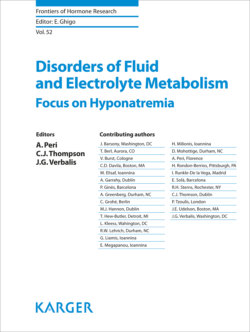Читать книгу Disorders of Fluid and Electrolyte Metabolism - Группа авторов - Страница 8
На сайте Литреса книга снята с продажи.
Historical Aspects of Hyponatremia
ОглавлениеChris J. Thompson a · Alessandro Peri b · Joseph G. Verbalis c
aAcademic Department of Endocrinology, Beaumont Hospital/RCSI Medical School, Dublin, Ireland; bSodium Unit, Endocrinology, Department of Experimental and Clinical Biomedical Sciences “Mario Serio”, “Center for Research, Transfer and High Education on Chronic, Inflammatory, Degenerative and Neoplastic Disorders for the Development of Novel Therapies” (DENOThe), University of Florence, Careggi University Hospital, Florence, Italy; cDivision of Endocrinology and Metabolism, Georgetown University, Washington, DC, USA
In almost 2 decades since the onset of the 21st century, there has been an explosion in interest in hyponatremia, which has resulted in a marked increase in the number of publications on the topic. This is remarkable as there is no evidence that the incidence or prevalence of the condition is increasing. Unlike new diseases, such as antibiotic-resistant infections or complications of the effects of cancer therapy, hyponatremia has always been there. However, the increased interest in hyponatremia reflects an improved understanding of the effects of hyponatremia on both morbidity and mortality, and equally, a recognition of the large gaps in our knowledge of this area. The expansion in the potential ramifications of hyponatremia, on falls, fractures and osteoporosis, as well as its association with increased mortality has focused on how much more still needs to be done to prove the causal relationships and to ascertain the value of therapeutic intervention. This has resulted in an academic environment characterised by healthy debate – and occasional dispute – among groups involved in hyponatremia research, which is beneficial since it further invigorates interest in hyponatremia. As a result, there has been a steady rise in publications on the topic of hyponatremia since the 1940s (Fig. 1).
However, the current clinical and academic interests in hyponatremia are relatively recent. For many years, hyponatremia was a topic that did not generate enthusiasm among journal editors or granting agencies, and indeed, was not attached to a specific sub-discipline of medicine. A small number of endocrinologists and nephrologists nurtured research programs that contributed to gathering knowledge on hyponatremia, but the majority of hospitals had no specialists who developed services for hyponatremic patients, or who set standards for investigations and management of the condition. The evolution of our knowledge on the physiology of the control of serum [Na+] concentration, and how that knowledge transformed the clinical approach to diagnosis and management of hyponatremia, is a journey worthy of some comment.
Fig 1. Cumulative numbers of PubMed publications on hyponatremia, by decade.
